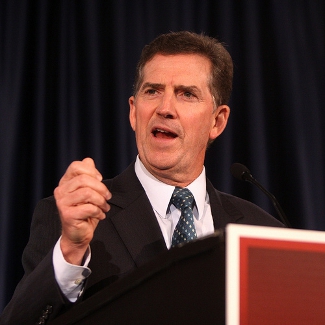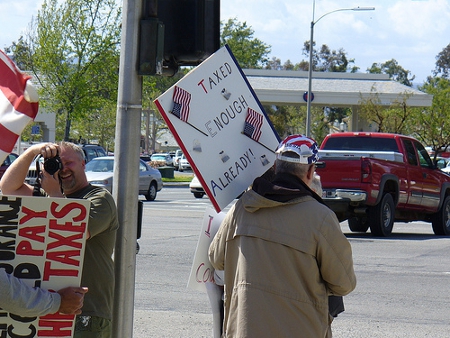 The Tea Party has taken much of the blame for the recent US government shutdown, with many commentators predicting that its influence is likely to be massively reduced. Cas Mudde argues that the Tea Party faction of the Republican Party is likely to continue; despite its likely diminishing funding from big business, it still enjoys a massive active base of support. The real challenge for the GOP in the lead up to the 2014 Congressional elections is to prove that it can be viable without the Tea Party.
The Tea Party has taken much of the blame for the recent US government shutdown, with many commentators predicting that its influence is likely to be massively reduced. Cas Mudde argues that the Tea Party faction of the Republican Party is likely to continue; despite its likely diminishing funding from big business, it still enjoys a massive active base of support. The real challenge for the GOP in the lead up to the 2014 Congressional elections is to prove that it can be viable without the Tea Party.
The past weeks have seen the return of the Tea Party to the center-stage of American politics. The movement that took the country by storm in 2009, dominated (the media coverage of) the 2010 elections, but largely failed in the 2012 elections, was now responsible for a government shutdown and almost caused the country’s default. Thousands of articles and op-eds were written about the extremism and irresponsibility of the ‘Tea Party Congress’ and about the spinelessness and weakness of the ‘moderate’ Republicans.
What a difference a day makes. While the Tea Party was controlling the GOP after the government shutdown, that same Tea Party is the big loser of the failed attempt to block the raising of the debt ceiling. Pointing to a ‘dramatic decrease’ in public support, the Tea Party is again predicted to die in the near future. After all, the shutdown has led to a ‘widened GOP-Tea Party rift’ and has angered the big financial backers of the party. Bloomberg even predicts a ‘Republican Civil War’ of ‘Business Groups v. Tea Party.’ Out of nowhere (mainstream right-wing) pundits come out of hiding and offer advice on ‘how the Republicans can neutralize the Tea Party.’ There is again money in being an anti-Tea Party Republican!

The last couple of weeks are also very exciting from an academic perspective. From its first emergence pundits and scholars have been divided over the question whether the Tea Party is mainly an Astroturf, i.e. big business and professional (Republican) operatives like FreedomWorks, or mainly a grassroots phenomenon, like the Tea Party Patriots, a loose federation of local and regional Tea Party groups. Where the two factions are united in their rejection of Obama(care), and ‘thus’ the government shutdown, they were bitterly divided over the debt ceiling. Unsurprisingly, the Astroturf faction won the fight in Congress. Not sooner had the influential Koch brothers spoken out against a national default, than House Speaker John Boehner started to lay the discursive foundations for a deal on raising the debt ceiling. But as soon as the Republicans had enabled the raising of the debt ceiling grassroots Tea Partiers opened the attack, among others on Boehner’s Facebook page.
The fact that the, mostly non-Tea Party, Republicans in Congress caved and changed their position on the debt ceiling is in no way evidence that the Tea Party is a pure Astroturf phenomenon. It mainly shows that professional politicians are more susceptible to money than people, hardly news. Moreover, most Tea Party Republicans opposed the compromise, despite the ‘advice’ from big business. One of the reasons is that ‘conservative’ Republicans have been able to fundraise more independently from the party leadership. Central to this strategy is Tea Party favorite Jim DeMint, the former Senator of South Carolina who left to lead the Heritage Foundation, which through the new Heritage Action tries to provide financial independence for the conservative/Tea Party GOP candidates. While the Heritage Foundation sided with big business on the compromise over the debt ceiling, DeMint was quick to praise the ‘courageous leadership’ of Senators Ted Cruz (R-Texas) and Mike Lee (R-Utah) and proclaim his unwavering opposition to Obamacare.
Equally important is that many surveys show remarkable support for the Tea Party and its extreme positions. While liberals, and (secretly) ‘moderate Republicans, celebrate that ‘nearly half (49 percent) of the public now view the Tea Party unfavorably,’ they forget that the 30 percent who view it favorably constitute the vast majority of the (open) Republicans. Moreover, while Republicans views of ‘moderate’ GOP leaders have become less positive, those of ‘Tea Party Senators’ like Ted Cruz have remained stable for all Republicans and have become significantly more positive for Tea Party Republicans. Moreover, various academic studies have shown the increasing overlap between Tea Party supporters and GOP supporters as well as their values. Tea Party values are not fundamentally different from GOP values. In essence, Tea Partiers are mostly more extreme and negative, which is a direct consequence of the low trust in the political system of Tea Party supporters.

So, where does that leave the Tea Party? Is the (Tea) Party over? I seriously doubt it is. This seems mostly wishful thinking of liberals and ‘moderate’ Republicans. And they have been wrong before and before. The Tea Party has always been Astroturf and grassroots, united in their fight against a vaguely defined enemy, Obama(care), and divided on both the means and the ends of their struggle. In many ways, it is the anti-globalization movement of the (far) right. Great at mobilizing already politicized people against an amorphous overarching evil, but poor at coming up with a broadly supported positive agenda. Its mobilization is strongly facilitated by the infrastructure of previously existing social movements, which has provided a largely unstructured movement with a strong (inter)national media profile, but it is still a grassroots mobilization.
The 2014 GOP primaries will show whether the Tea Party was indeed just an Astroturf invention, as many liberals have claimed, or whether it is, and always was, a true grassroots movement, as most conservatives proclaim. It will also show whether there still is a viable non-Tea Party GOP. Because even if big business is going to fund non- or even anti-Tea Party candidates, which isn’t a foregone conclusion at all, there is no guarantee that these candidates will be able to win either the primaries or the actual elections. After all, the problem is not necessarily mobilizing non-Tea Party GOP candidates, it is mobilizing non-Tea Party GOP activists and voters. Simply running as an anti-Tea Party Republican won’t do the trick; it will probably get you money, it will definitely get you grassroots opposition, but it will probably not get you much grassroots support.
The real challenge for ‘moderate’ Republicans, then, is to find an issue that will mobilize both ‘moderate’ and ‘Tea Party’ Republicans. More importantly, it should be an issue on which ‘moderate’ Republicans can come across as more competent than ‘Tea Party’ Republicans. This by and large excludes all negative issues, i.e. all issues based on opposition to something – be it Obamacare, raising the debt ceiling (again), immigration reform, or whatever – as the Tea Party will always be more consistent and extreme in their opposition. Traditionally national security issues have been great for mainstream Republicans, but the GOP base has turned increasingly isolationist, and there is no credible threat to the homeland. Fiscal responsibility sounds great, but has so far not led to convincing policies, let alone a budget that could pass in Congress.
In short, the ‘moderate’ GOP is increasingly a party with money but without (active) supporters. This might be enough to influence the public debate through expensive political campaigns, parroted by pundits on Fox News and other national media outlets, but is not enough to set the political agenda and dominate national policies. In contrast, the Tea Party might become a movement without (much) money but with an active mass base. Left to its own devices, i.e. deprived of (most) Astroturf support, the Tea Party grassroots might lose its national agenda-setting powers, but can still be a major player at the local and regional level – North Carolina provides a chilling example of what that looks like.
Please read our comments policy before commenting.
Note: This article gives the views of the authors, and not the position of USApp– American Politics and Policy, nor of the London School of Economics.
Shortened URL for this post: http://bit.ly/19ZukOJ
_________________________________
 Cas Mudde – University of Georgia
Cas Mudde – University of Georgia
Cas Mudde is an assistant professor in the Department of International Relations at the University of Georgia. He is the author of Populist Radical Right Parties in Europe(2007) and co-editor of Populism in Europe and Latin America: Corrective or Threat for Democracy? (2012).



